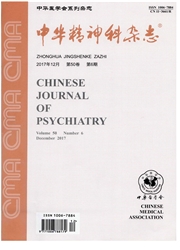

 中文摘要:
中文摘要:
目的 了解亲代酒精暴露诱导的组蛋白修饰改变是否遗传给子代,探讨亲代酒精暴露对子代的酒精觅药行为影响的表观遗传机制.方法 24只雄性和24只雌性Wistar大鼠按照完全随机法随机予以酒精或生理盐水处理15 d,后戒断15 d,两两配对成4个组,繁殖后取其子代分为2组:子代非酒精暴露组(48只),子代酒精暴露组(48只).采用条件性位置偏爱(CPP)模型评价子代的酒精觅药行为.实时荧光定量逆转录-聚合酶链反应(RT-PCR)和染色质免疫共沉淀(CHIP)方法检测亲代和子代慢性酒精暴露的Wistar大鼠前额叶皮质(PFC) htr3a mRNA水平和启动子区组蛋白修饰情况.结果 (1)子代非酒精暴露组:亲代酒精处理组的子代htr3a mRNA水平、htr3a基因启动子区组蛋白H3K9乙酰化水平比亲代生理盐水处理组的子代升高(F=31.496,P<0.001;F=10.333,P<0.001).(2)子代酒精暴露组:亲代酒精处理组的子代CPP分值比亲代生理盐水处理组的子代升高(F =11.436,P<0.001);其htr3a mRNA水平、htr3a基因启动子区组蛋白H3K9乙酰化水平比亲代生理盐水处理组的子代升高(F=26.105,P<0.001;F=3.740,P<0.05).结论 亲代慢性酒精暴露引起的组蛋白H3K9乙酰化可稳定地遗传给子代,亲代慢性酒精暴露可能通过增加子代htr3a基因启动子区组蛋白H3K9乙酰化增强子代的酒精觅药行为.
 英文摘要:
英文摘要:
Objective To investigate whether the offspring of chronic ethanol exposured Wistar rats inherited the changes of histone modification. To explore the epigenetic mechanism of the effect of chronic ethanol exposured Wistar rats on the ethanol-seeking behavior of their offspring. Methods Twenty-four male and 24 female adult Wistar rats were randomly injected ethanol and saline for 15 days and experienced withdrawal for 15 days, then coupled into 4 groups. The offspring of the 4 groups were divided into two groups, 48 rats without ethanol exposure and 48 rats with ethanol exposure. Conditioned place preference (CPP) was used to evaluate the ethanol-seeking behavior. Using reverse transcription-polymerase chain reaction (RT-PCR) and chromatin immunopreeipitation (CHIP) assays, the levels of htr3a mRNA and specific histone modifications in htr3a promoter region of prefrontal cortex (PFC) were determined respectively. Results ( 1 ) In the offspring without ethanol exposure, the htr3a mRNA expression level and the H3K9 acetylation in htr3a promoter region were significantly increased in ones with parental ethanol exposured than ones with parental saline exposured ( F = 31. 496, P 〈 0. 001 ; F = 10. 333, P 〈 0. 001 ). (2) In the offspring with ethanol exposure, the CPP score was significantly higher in ones with parental ethanol exposured than ones with parental saline exposured ( F = 11. 436, P 〈 0. 001 ). The htr3a mRNA expression level and the H3K9 aeetylation in htr3a promoter region were significantly higher in offspring of saline exposured rats than ones of ethanol exposured rats ( F = 26. 105, P 〈 0. 001 ; F = 3. 740, P 〈 0. 05 ). Conclusion Chronic ethanol exposure could induce H3K9 aeetylation in htr3a promoter region and be inherited between generations. Parental exposure to ethanol may enhance the ethanol-seeking behavior through mechanisms involving H3K9 acetylation in htr3a promoter region.
 同期刊论文项目
同期刊论文项目
 同项目期刊论文
同项目期刊论文
 Differences between smokers and non-smokers inregional gray matter volumes: a voxel-based morphometr
Differences between smokers and non-smokers inregional gray matter volumes: a voxel-based morphometr Conditioned Place Preference Associated with Level of Palmitoylation of PSD-95 in Rat Hippocampus an
Conditioned Place Preference Associated with Level of Palmitoylation of PSD-95 in Rat Hippocampus an 期刊信息
期刊信息
